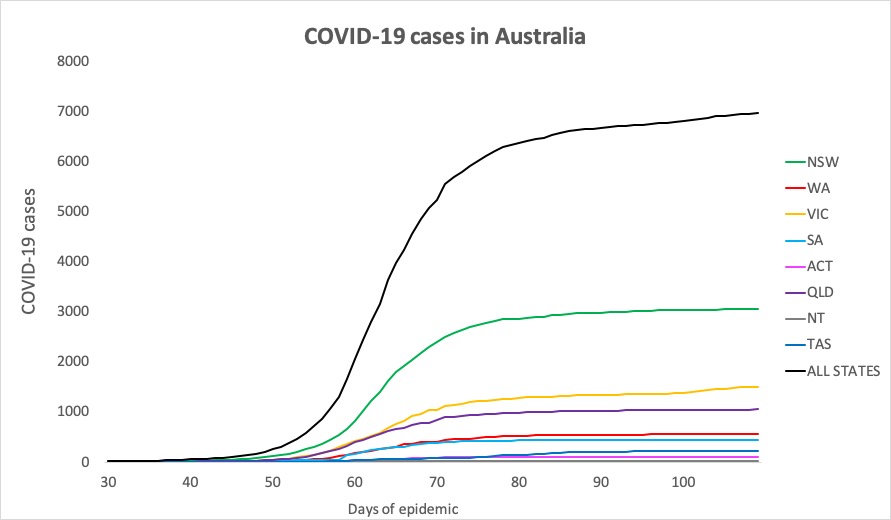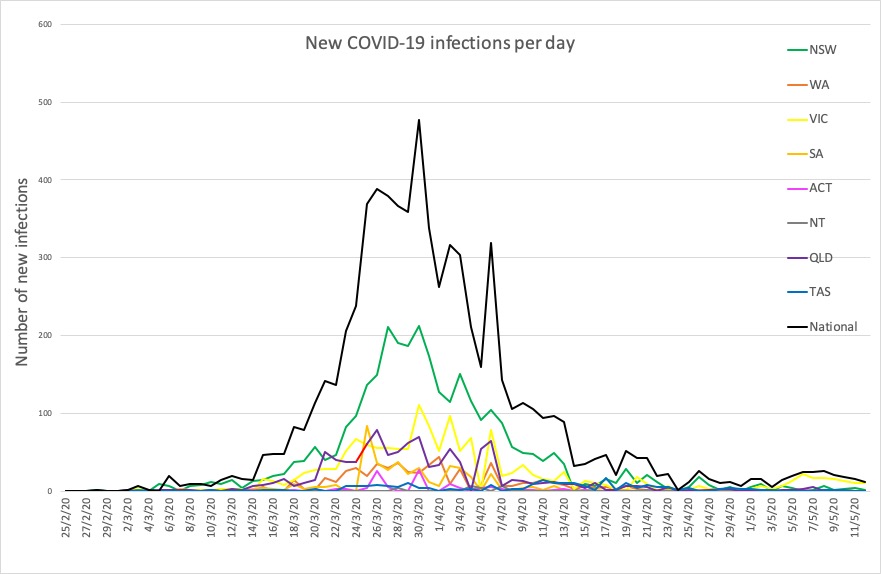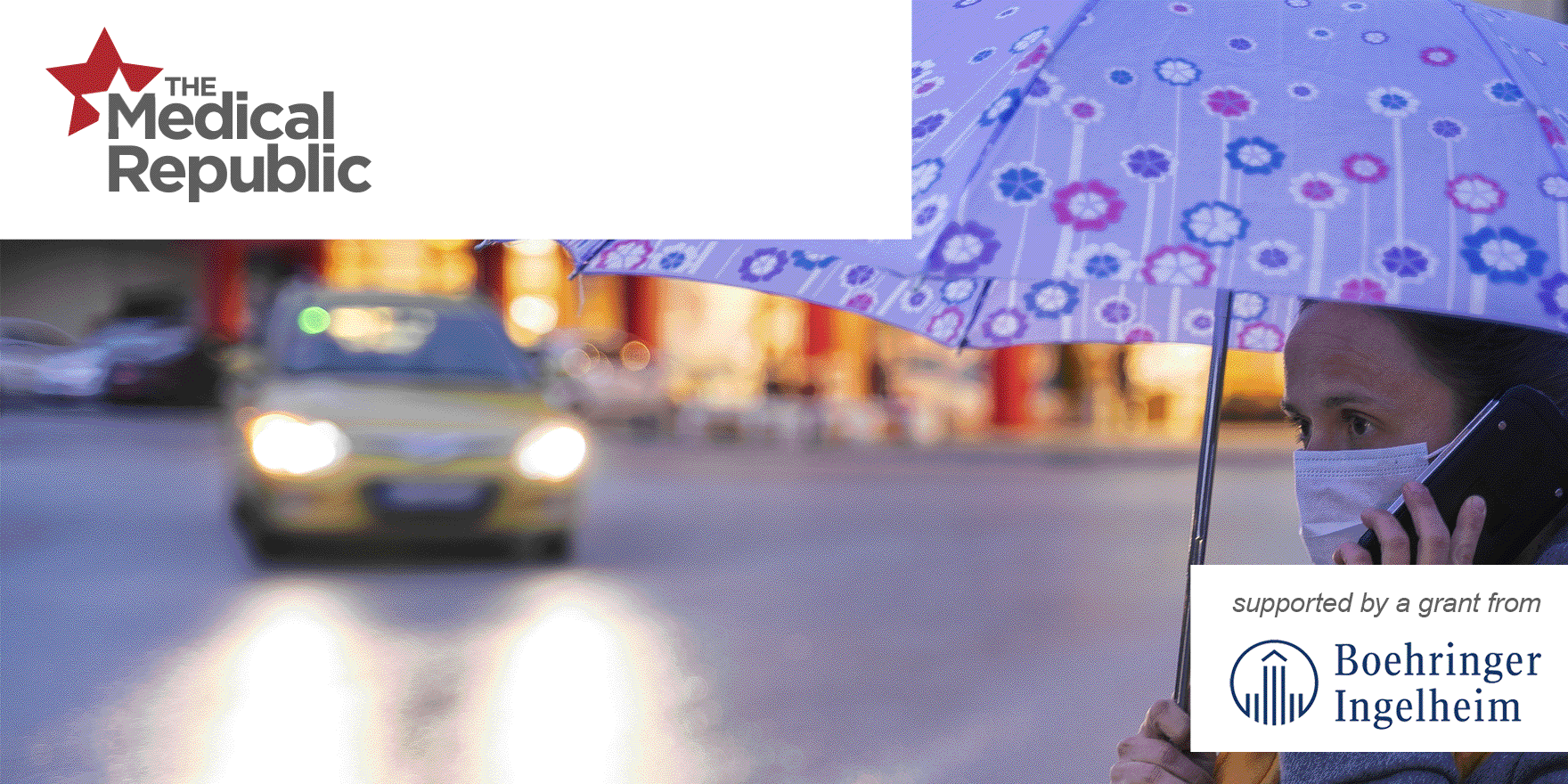The majority of children admitted to intensive care with COVID-19 have pre-existing conditions such as cancer, immunosuppression, obesity or complex medical needs, new research suggests
Thanks for joining us on The Medical Republic‘s live COVID-19 blog.
And thank you to our sponsor and supporter for funding this project with an independent grant, Boehringer Ingelheim.
The latest
- Comorbidities common in children with COVID-19 treated in intensive care, study finds.
- Melbourne McDonald’s restaurant linked to cluster of six COVID-19 cases.
- 100th GP-led respiratory clinic in nearly two months opens its doors.
5.11pm, 13 May
- Feeling out of the loop on COVID-19? Here’s a news round up from the past week, brought to you by science freelancer Bianca Nogrady (that’s me!), podcast hosts Felicity Nelson and Francine Crimmins and TMR reporter Penny Durham, who’s got an interesting and disturbing tale about children getting strange complications from COVID-19…
- A McDonald’s restaurant in Melbourne has been linked to six cases of COVID-19 in Victoria; four employees and two family members have tested positive since last Thursday.
The restaurant has since closed to undergo a ‘deep clean’, and 96 employees have been tested for the virus.
According to a story in The Age, McDonald’s restaurants in the United Kingdom have closed because of the pandemic, while Australian McDonald’s are carrying on, and still using touch-screens for customer ordering.
Would you like a side order of virus with that burger?
- The 100th GP-led respiratory clinic in Australia has opened its doors in Mudgee in regional New South Wales, just under two months after the first such clinic opened.
Federal Health Minister Greg Hunt commended the speed with which these GP clinics have been set up around the country, as part of the government’s COVID-19 response.
“This has only been possible because of the dedication and professionalism of our GPs, their staff and their representative organisations, all of whom deserve our thanks,” Minister Hunt said in a statement.
- The majority of children admitted to intensive care with COVID-19 have pre-existing conditions such as cancer, immunosuppression, obesity or complex medical needs, new research suggests.
A paper published in JAMA Pediatrics describes 48 children, with a median age of 13 years, admitted to paediatric intensive care units in the United States, of whom 40 (83%) had pre-existing comorbidities. Half the patients had one comorbidity, 17% had two and nearly one in five had three or more significant comorbidities.
Three-quarters of the patients presented with respiratory symptoms and nearly 40% needed invasive ventilation, including extracorporeal membrane oxygenation in one patient.
Despite the current reservations about hydroxychloroquine, 11 patients were treated with the drug by itself and a further 10 were treated with hydroxychloroquine in combination with another therapy such as azithromycin. The study didn’t look at outcomes related to treatment.
Two of the 48 patients died, and nearly one-third were still hospitalised at the follow-up point, which was 1-4 weeks after admission.
Patients stayed in intensive care for a median of five days – the longest stay being nine days – and in hospital for a median of seven days.
“Consistent with the few other initial reports on COVID-19 on children, our study found the clinical course of COVID-19 to be far less severe and the hospital outcomes to be better in critically ill children than those reported in adults,” the authors wrote.
Commenting on the impact of comorbidities, the authors noted that the most common one was long-term dependence on technological support, such as tracheostomy.
“While it is difficult to draw parallels between children and adults when considering comorbidities, children often bear the consequences of congenital conditions in contrast with adults in whom comorbidities are often acquired and may be associated with lifestyle,” they wrote.
- Australia will soon have its first ever deputy chief medical officer for mental health, in the form of Associate Professor Ruth Vine, former chief psychiatrist of Victoria.
Federal Health Minister Greg Hunt announced the appointment on Sky News this morning, saying the role shows the importance of mental health, particularly during the COVID-19 pandemic.
“We know during any economic crisis, there’s a long history that this can have a demonstrated impact on mental health,” he told Sky News. “When you add that to the uncertainty of a health crisis as well, it’s completely understandable that there is a risk and that’s why we’re getting ahead of the curve.”
The Royal Australian and New Zealand College of Psychiatrists welcomed news of the appointment.
“‘This is an excellent decision by the government which demonstrates its commitment to the mental health and wellbeing of all Australians, especially during these difficult times,” RANZCP President, Associate Professor John Allan, said in a statement.
- Melbourne GP Dr Karen Price, currently deputy chair of RACGP Victoria, has announced on GPDU and Twitter that she will be stepping up when nominations open for the RACGP presidential elections.
“So much work to do on GP leadership,” she tweeted.
“I can’t give you too many details because the elections haven’t been announced yet,” Dr Price said when we rang to ask about her campaign platform.
“I’m going to try and rebuild general practice and engage the members in a thriving sector, and that means have a very broad approach, using all the strengths of our members and member organisations, so it’s bringing everyone together and creating a vision for rebuilding general practice.”
- The Australian Health Practitioner Registration Agency said it was not currently in a position to refund or waive registration fees for practitioners who aren’t working at the moment or who are under financial stress. However the organisation said it was considering how to support individual practitioners who might be struggling financially, especially if that hardship might prevent them from re-registering.
In an updated Q&A on registration issues, AHPRA also acknowledged the impact of office closures on English language testing but said at-home versions of the English language tests have not been approved by AHPRA boards so at the moment they cannot be accepted.
“We are working to identify options while English language tests are disrupted, including whether we may be able to extend the validity of test results safely,” the statement said.
They also addressed reregistration of practitioners wanting to help out during the COVID-19 pandemic, saying that many were asking if some of the reregistration requirements – such as the English language test – might be exempted. Their response is that they are looking at these issues and will update soon, but they are working hard to speed up registration particularly for the priority workforce such as doctors, nurses, midwives and pharmacists.
- Here are today’s confirmed COVID-19 figures to 9pm yesterday. Victoria’s count is still rising higher than any other state, although Queensland recorded another six cases having had zero new cases for several days:
National – 6964, with 97 deaths and 6229 recovered
ACT – 107
NSW – 3053
NT – 29
QLD – 1051
SA – 439
TAS – 227
VIC – 1507
WA – 551


Disclaimer: The content on the Medical Republic COVID-19 blog is independently created by Medical Republic without input from Boehringer Ingelheim Pty Ltd. The views, information, or opinions expressed on the Medical Republic COVID-19 blog are Medical Republic’s own and do not necessarily represent those of Boehringer Ingelheim Pty Ltd. Boehringer Ingelheim Pty Ltd is not responsible for and does not verify the accuracy of any content on the Medical Republic COVID-19 blog.


